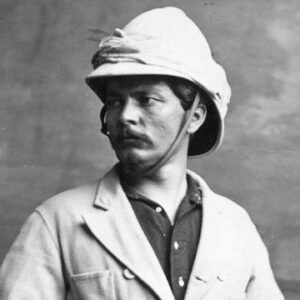Henry Stanley was an Anglo-American explorer and journalist who was instrumental in the exploration and colonization of central Africa. He is best known for his hunt for missionary and explorer David Livingstone, whom he supposedly encountered and inquired, “Dr. Livingstone, I presume?” Stanley participated in an exhaustive quest for the Nile’s source as an explorer and was a key figure in the Emin Pasha Relief Expedition. Stanley, who was born out of wedlock in Wales, had a rough childhood filled with violence and neglect. He fled to the United States as a teenager, and his fortunes improved. He became a journalist after becoming a bright and adventurous young man, and his employer dispatched him to Africa to look for Scottish missionary and explorer David Livingstone, who was known to be in Africa but had not been heard from in a long time. After a perilous voyage, Stanley finally discovered Livingstone and received a favorable reputation as a result of the experience. In the years that followed, he went on several more trips, exploring huge areas of central Africa and traveling the length of the Lualaba and Congo Rivers. He was clearly a remarkable explorer, but he was also seen as a ruthless guy who subjected African natives to unspeakable torture during his journeys.
Childhood and Adolescence
Henry Stanley was born on January 28, 1841, in Denbigh, Wales, to an unmarried 18-year-old girl named Elizabeth Parry. His mother abandoned him as a child, leaving him to the mercy of relatives. John Rowlands was thought to be his biological father, and the boy was named after him.
Little John was raised by his maternal grandfather, who died when he was about five years old. He was transferred to the St Asaph Union Workhouse for the Poor after residing with family for a spell. He was frequently abused by the older boys there.
At the age of 15, he finished his elementary education and left the workhouse. The shame of illegitimacy, the fear of being abandoned by his mother, and the atrocities he witnessed at the workhouse would all haunt him for the rest of his life.
A Years Later
He yearned for adventure as a teenager and desired to start a new life. As an 18-year-old, he obtained work as a cabin boy on a ship and traveled to the United States.
He arrived in New Orleans and immediately began seeking work. A chance meeting with Henry Hope Stanley, a wealthy dealer, led to a job. He built a close friendship with his childless boss and his wife, who began treating him like a son over time. John Rowlands took the moniker “Henry Stanley” out of love and admiration for his boss.
He was a soldier in the American Civil War and fought in the Battle of Shiloh in 1862. Later, before joining the Navy in 1864, he worked on various commerce ships. He served as a record keeper on the ship ‘Minnesota,’ which piqued his interest in journalism.
Stanley began a career as a journalist soon after, and in 1867, he was named special reporter for the ‘New York Herald.’ He was highly successful in this arena, and the young man’s journalistic abilities astonished James Gordon Bennett, the creator of the New York Herald.
In 1869, the ‘New York Herald’ tasked Stanley with finding Scottish missionary and explorer David Livingstone, who was believed to be in Africa but had gone missing. Livingstone was a well-known figure, and any news concerning him would have boosted newspaper sales.
Stanley arrived in Zanzibar in March 1871 with a group of 200 porters. The group went on a terrifying journey through the tropical rainforest, battling difficult weather conditions and diseases. The group set off for Lake Tanganyika, Livingstone’s last known stop.
On November 10, 1871, Stanley discovered Livingstone near Lake Tanganyika at Ujiji. The famed explorer was discovered in a state of great frailty and illness, but he recovered and rejoined Stanley’s expedition.
Livingstone and Stanley spent the next four months hunting for the Nile’s source in the area around Lake Tanganyika. Stanley returned to London after determining that there was no connection between Lake Tanganyika and the Nile River, while Livingstone stayed to continue his explorations.
‘How I Found Livingstone; journeys, experiences, and discoveries in Central Africa’ was published in 1872 by Stanley.
Stanley returned to Africa for additional expeditions, exploring huge areas of central Africa and becoming the first European to map these territories by traveling down the length of the Lualaba River and following the Congo River all the way to the Atlantic Ocean in 1877.
In 1886, he led the Emin Pasha Relief Expedition to “rescue” Emin Pasha, the governor of Equatoria in Sudan’s south. He finally encountered Emin in 1888 and returned with him in 1890 after a grueling voyage.
Henry’s Expedition Major
After an extraordinarily tough trip through the inhospitable terrains of central Africa, Henry Stanley is most remembered as the explorer who discovered the lost David Livingstone. As the only white man in the area, he said, “Dr. Livingstone, I presume?” when he saw the Scottish missionary and adventurer near Lake Tanganyika.
Achievements and Awards
The Swedish Society for Anthropology and Geography (SSAG) gave him the Vega medal in 1883.
In 1899, Henry Stanley was knighted Grand Cross of the Order of the Bath for his service to the British Empire in Africa.
Personal History and Legacy
In 1890, he married Welsh artist Dorothy Tennant, with whom he had a son, Denzil.
On May 10, 1904, he died in London.
Estimated Net worth
Henry is one of the wealthiest and most well-known explorers. Henry Morton Stanley’s net worth is estimated to be $20 million, according to Wikipedia, Forbes, and Business Insider.


